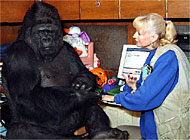
In conversation with a primate’s relative

Penny Patterson, one of the world's leading animal conservationists, was recently in Switzerland to attend an international conference on ways of protecting the dignity of animals. Ramsey Zarifeh caught up with her in Basel.
Despite a long running controversy over the rights of animals among the Swiss, Penny Patterson says Switzerland has a far more progressive attitude towards animals than her native country, the United States.
“The Swiss are very advanced in their thinking along these lines. Their constitution has already referenced the dignity of the animal for many years, and that is certainly not true in the United States.”
Patterson started working with lowland gorillas some 30 years ago, when she signed up for a four-year research programme called the Gorilla Language Project.
Three decades later, she is still part of the programme, and in the process has gained something entirely unexpected: an adoptive daughter.
Koko was an undernourished baby gorilla when she was taken in by Patterson’s Gorilla Foundation, but she has since become one of the most important test cases for research into the behaviour and intelligence of the species, as well as something of a celebrity.
According to Patterson Koko has an impressive understanding of English and can communicate using American Sign Language. She is also probably the only gorilla in the world to have her own website.
Patterson claims to have taught Koko over 1000 signs, though the learning process has not always been smooth.
“If I tried to teach her a word she had no interest in, like eggs, she never really learnt the sign,” says Patterson. “But she loved to play chase, so that sign was learned quickly.”
Patterson and Koko have been together for 30 years – something the conservationist says she never would have believed was possible, when she first accepted the job: “I was expecting an animal project and assumed I’d be able to leave after four years. But what I ended up with was a daughter, and you can’t leave your daughter after four years.”
The experience, she says, demonstrates not only how emotionally connected humans and gorillas are, but how similar they are on levels as complex as abstract thinking and creativity.
Patterson’s next project is to open a sanctuary on the island of Maui in Hawaii as a permanent home for gorillas currently held in captivity. She says such sanctuaries are vital if these animals are to be saved from extinction.
However, financial problems have already delayed the opening of the sanctuary, which was due to receive its first gorillas in spring 2002.
Patterson hopes that public forums such as the conference in Switzerland will increase awareness of the need for conservation projects and for further research into the behavioural patterns of the animals.
If and when the Maui sanctuary is completed, one of the first gorillas to inhabit the island will be Koko. For the time being, she is staying at the research foundation in California, waiting for Patterson to return – with some Swiss souvenirs, perhaps?
“I’ve already done some shopping and bought her some fabrics with animals on them and also some dark Swiss chocolate, because she loves that,” says Patterson.
by Ramsey Zarifeh

In compliance with the JTI standards
More: SWI swissinfo.ch certified by the Journalism Trust Initiative



























You can find an overview of ongoing debates with our journalists here . Please join us!
If you want to start a conversation about a topic raised in this article or want to report factual errors, email us at english@swissinfo.ch.